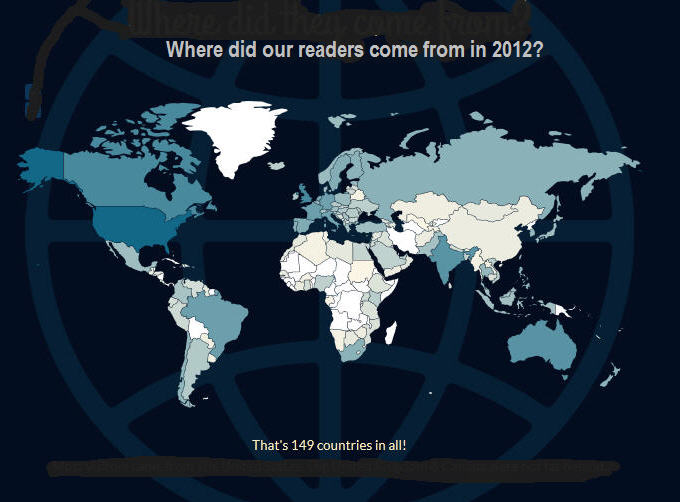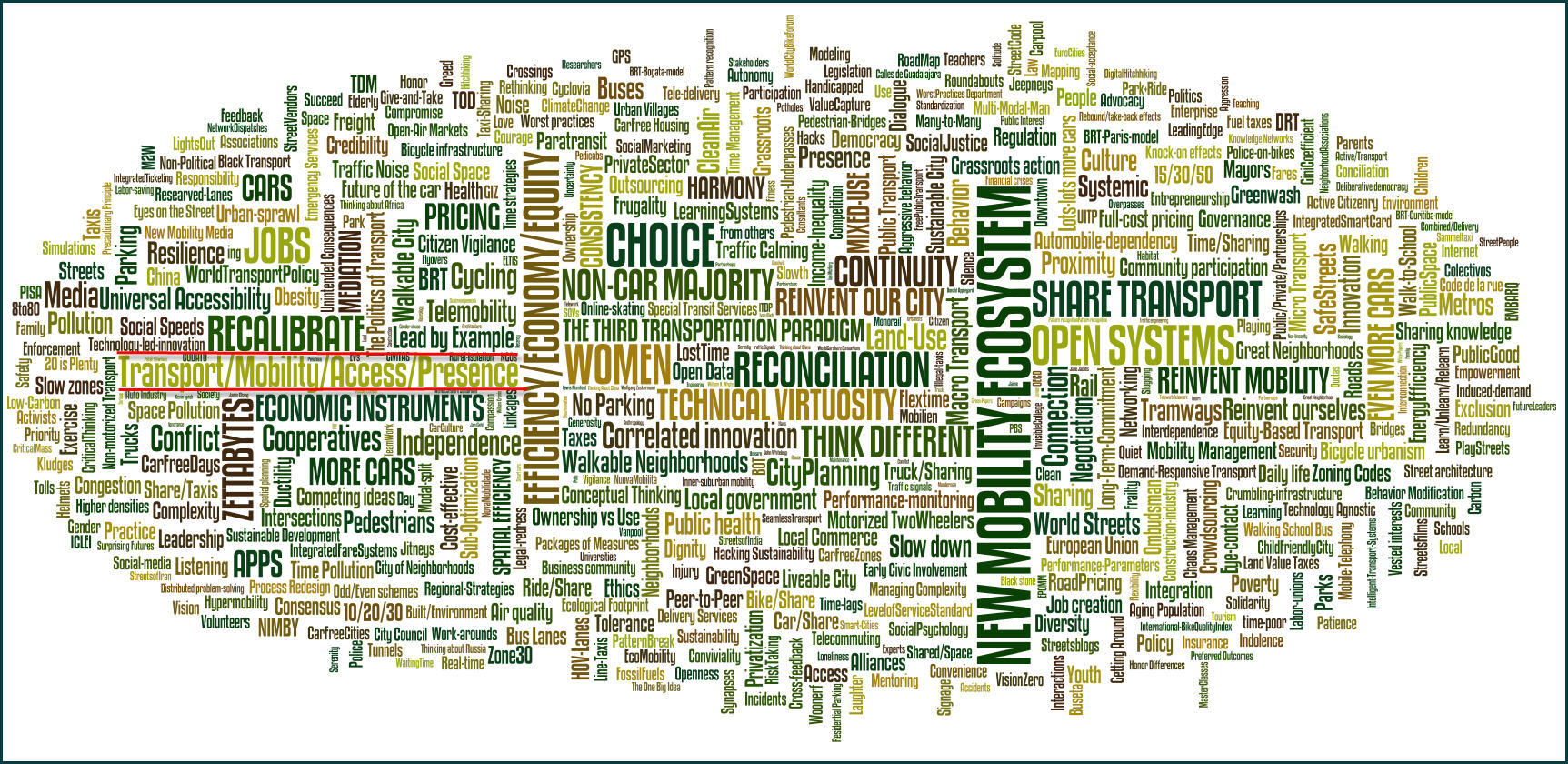Monday, December 31, 2012
Sunday, December 30, 2012
Zetabytes, Open Systems and Worrying about Equity
Zetabytes, Open Systems and Worrying about Equity
This is the first in a series on big data and its impact on society from CSPO co-
 director Daniel Sarewitz, published in Slate on 27 Dec. 2012. It also appears on As We Now Think, a site edited by the Consortium for Science, Policy, and Outcomes at Arizona State University. ASU is a partner in Future Tense with Slate and the New America Foundation.
director Daniel Sarewitz, published in Slate on 27 Dec. 2012. It also appears on As We Now Think, a site edited by the Consortium for Science, Policy, and Outcomes at Arizona State University. ASU is a partner in Future Tense with Slate and the New America Foundation.We share this with our readers with one eye to our on-going Zetabytes/Open Systems series that will be getting close attention in the year ahead -- with the other eye to our Equity-Based Transport series, also to continue full speed ahead in 2013.
--> Read on:
Monday, December 24, 2012
For your holiday reading pleasure: Top twenty World Streets postings in 2012
While you are away from the office and the pressures to stay on  focus, here for your holiday reading pleasure are the twenty most read articles to appear in World Streets over 2012. Quite a varied lot, and when your editor reads them he generally prefers to do so not at a desk but seated comfortably with a tablet or largish window smartphone in hand to take advantage of those unstructured unexpected free moments that can pop up in any day. After all, World Streets is for the reflective back of your mind, not the whirring front.
focus, here for your holiday reading pleasure are the twenty most read articles to appear in World Streets over 2012. Quite a varied lot, and when your editor reads them he generally prefers to do so not at a desk but seated comfortably with a tablet or largish window smartphone in hand to take advantage of those unstructured unexpected free moments that can pop up in any day. After all, World Streets is for the reflective back of your mind, not the whirring front. 
Saturday, December 22, 2012
Signals, Perception, Behavior : Questions, Blurs and Hints
In transportation circles, most often in Europe but not uniquely there, we often hear the term "behavior modification", which is usually brandished as something  that somebody else has to learn to do and cope with. More often than not this matter of behavior modification when it comes to how, when and where people drive cars, but we can also hear about it with reference to pedestrians, cyclists and other drivers and street denizens. And as we can see from the results, this matter of behavior and modification turns out to be quite a challenge.
that somebody else has to learn to do and cope with. More often than not this matter of behavior modification when it comes to how, when and where people drive cars, but we can also hear about it with reference to pedestrians, cyclists and other drivers and street denizens. And as we can see from the results, this matter of behavior and modification turns out to be quite a challenge.
Friday, December 21, 2012
Cities, Transport and Equity in Africa: Unasked Questions
In a fair world it should be unthinkable to ignore the needs of close to one billion 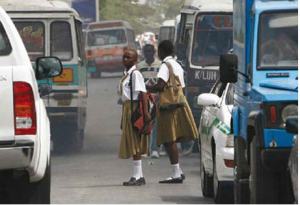 of the poorest people on the earth living in its second-largest and second most-populous continent. A part of the world with already one-third of the population living in cities, most of whom in slums, and with the flow of people from the country side continuing at record rates.
of the poorest people on the earth living in its second-largest and second most-populous continent. A part of the world with already one-third of the population living in cities, most of whom in slums, and with the flow of people from the country side continuing at record rates.
The transportation arrangements in most people’s daily lives in Africa come in several flavors, few of them appetizing: ranging from world-class traffic jams making it close to impossible to negotiate the streets of the larger cities for hour each day, to at the other extreme no provision for vital survival transport (water, wood for fires, food) for the remainder of the continent.
Monday, December 17, 2012
New Mobility Consult: 2013
One way of looking at World Streets and its world wide network of diverse international partners, publications, programs, multiple networks,  focus groups. continuing research and professional activity in our chosen field is to see it as the visible tip of a very large iceberg of experience and competence which can be put to work on your projects and programs. The greater part of this considerable mass is the New Mobility Agenda, an open collaborative program that has been in constant progression since 1988. By making use of our consultancy and advisory services through New Mobility Consult, you are, I might add, also helping us to fund and carry on with the non-profit work of the journal. Here are some of the ways in which this competence can be put to work for your city, agency or firm.
focus groups. continuing research and professional activity in our chosen field is to see it as the visible tip of a very large iceberg of experience and competence which can be put to work on your projects and programs. The greater part of this considerable mass is the New Mobility Agenda, an open collaborative program that has been in constant progression since 1988. By making use of our consultancy and advisory services through New Mobility Consult, you are, I might add, also helping us to fund and carry on with the non-profit work of the journal. Here are some of the ways in which this competence can be put to work for your city, agency or firm.
Op-Ed: Toward More Prosperous Cities
- Op-Ed Contributor: Wendell Cox, published 14 Dec. 2012. Comments invited
I appreciate Eric Britton's gracious invitation to contribute my views on cities and urban transport to World Streets. Obviously, many readers will disagree with all or part the article. Nonetheless, the state of knowledge is never complete and progress continues to depend on open minds and civil discussion of perspectives among people of good will. There is extensive use of "hyperlinks," which provide direction to greater detail for any interested. The article begins with the public policy context, then follows with urban policy, urban transport and sustainability. --> Read on:
Sunday, December 16, 2012
Albert Hirschman in Latin America: Notes on Hirschman´s Trilogy on Economic Development.
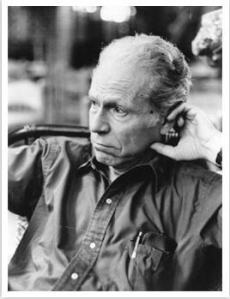 This paper published in 2004 by professor Ana Maria Bianchi of the Faculty of Economics of the University of São Paulo offers more in this series on the work and considerable contributions of the great economist and social scientist Albert Hirschman who died on Monday of this week in Princeton New Jersey. (Also see the earlier homage that appeared here "Earth, receive an honoured guest. In Memory of Albert O. Hirschman" at http://wp.me/psKUY-2DJ )
This paper published in 2004 by professor Ana Maria Bianchi of the Faculty of Economics of the University of São Paulo offers more in this series on the work and considerable contributions of the great economist and social scientist Albert Hirschman who died on Monday of this week in Princeton New Jersey. (Also see the earlier homage that appeared here "Earth, receive an honoured guest. In Memory of Albert O. Hirschman" at http://wp.me/psKUY-2DJ )
Thursday, December 13, 2012
My basic theory about 2013 is this.
My basic theory about 2013 is this:
If what we try to do in 2013 looks like something that we would have done back in the late years of the last century, it will not be good enough. That's the test I try to apply to my work every day.
Being different is not a guarantee of success. But NOT being different is a guarantee of sure failure. --> Read on:
Letter from Bangalore: The Derelict Mile
Sujaya Rathi reports from Bangalore: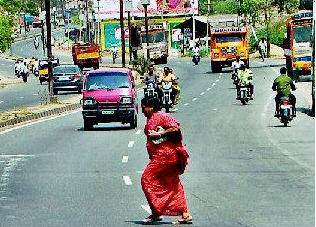 Private vehicles in India have seen an unprecedented growth in past two decades and there is no sign of slowing down. Many initiatives to curb the trend have not been successful. This article highlights an important aspect that attribute to the above unsustainable phenomenon, which has been ignored: "The Derelict Mile".
Private vehicles in India have seen an unprecedented growth in past two decades and there is no sign of slowing down. Many initiatives to curb the trend have not been successful. This article highlights an important aspect that attribute to the above unsustainable phenomenon, which has been ignored: "The Derelict Mile".
Wednesday, December 12, 2012
Earth, receive an honoured guest. In Memory of Albert O. Hirschman
Lyon. 12 December 2012. A personal tribute for my friends and family.
 The news came in the middle of the night in the cold winter of Lyon. My professor and life example Albert Hirschman has left us. And I am finally very glad, because those last few years of illness were far too harsh for any man or woman to bear.
The news came in the middle of the night in the cold winter of Lyon. My professor and life example Albert Hirschman has left us. And I am finally very glad, because those last few years of illness were far too harsh for any man or woman to bear.I have a hard time in organizing my thoughts this cold morning, but two things I do know and would like to share with you. The first being that Albert Hirschman was a great man and a huge influence in the field that he had chosen for his own, economics in the broadest sweep of the term. And well beyond that. --> Read on:
Editorial: No FPT without SCR (Systematic Car Reductions)
This is a simple fact! Free Public Transport (FPT) has no possible justification whatsoever unless your governing officials are willing to do something about adjusting the modal mix and bringing down car ownership and use in the city strategically and as quickly as possible SCR - (Systematic Car Reductions).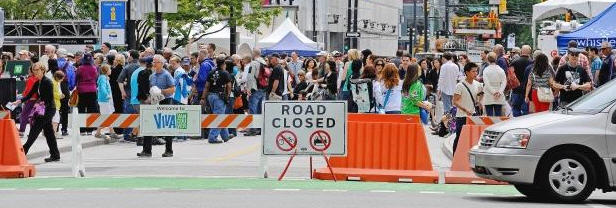
The tools for achieving these necessary adjustments in the modal split are well known, experience-proven and widely used in cities of all sizes in many parts of the world. There is no possible justification that competent public authorities not be aware of these proven tools and policies. They include most notably:
Heads-up: To avoid duplicate mailings from Facebook
Heads-up: To avoid duplicate mailings from Facebook
Dear Patient Reader,
 To avoid duplicate mailings from our various programs and fora, it may be useful to note the difference between our two main FB pages at (1) http://www.facebook.com/NewMobilityAgenda and (2) http://www.facebook.com/worldstreets. The former posts only information that appears in World Streets (http://worldstreets.org), while the latter includes all these but also contains other pieces, heads-up and observations from our vigilant editor.
--> Read on:
To avoid duplicate mailings from our various programs and fora, it may be useful to note the difference between our two main FB pages at (1) http://www.facebook.com/NewMobilityAgenda and (2) http://www.facebook.com/worldstreets. The former posts only information that appears in World Streets (http://worldstreets.org), while the latter includes all these but also contains other pieces, heads-up and observations from our vigilant editor.
--> Read on:
Tuesday, December 11, 2012
Op-Ed: The Story of UK Roads/Streets.
Op-Ed: The Story of UK Roads/Streets
 Poorly designed roundabouts - enabling even HGV's to travel around them at speed, the police thinking a cyclist could make a driver aware of "him" with a bell or a whistle...
Poorly designed roundabouts - enabling even HGV's to travel around them at speed, the police thinking a cyclist could make a driver aware of "him" with a bell or a whistle...- Police on bicycles without blue lights or sirens, chasing others through red lights... then stopping others for doing the same, who proceeded with caution,
- Advanced stop lines seem to provide little benefit, and may have been partly to blame for the death of Cynthia McVitty's daughter.
- Humans get territorial, and thus cycle lanes become hazards for cyclists when too narrow, and for pedestrians when they step onto them,
- Too many cyclists in the UK cycle at speeds inappropriate to the situation.
- Ian Perry. Cardiff, Wales, UK ianenvironmental@googlemail.com
--> Read on:Monday, December 10, 2012
Op-Ed: Awful Injustice in Parking
Op-Ed: Awful Injustice in Parking
Misguided parking policy is harmful and unjust.
No surprise there, you may say. There is no shortage of complaints about parking prices ("unfair!") and about how difficult it is to find parking. We hear the same thing all over the world, whether in Sydney, San Francisco, Singapore, Moscow, Delhi , Jakarta, Beijing, Sao Paolo, Lagos or Nairobi.
Sorry to be unsympathetic. But complaints like those are a problem. They are fuel for the never-ending push for more parking and cheaper parking.
So what? --> Read on:
Thursday, December 6, 2012
Civil Society and European Union Policy and Practice in the Field of Transportation
Look out. This time our friends over at the European Economic and Social 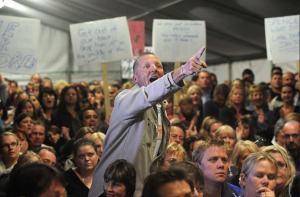 Committee (JDE62) in Brussels are doing a terrific thing. Tomorrow morning they open their doors for a one day conference and peer brainstorm on Civil Society and European Union Policy and Practice in the Field of Transportation (my title). As latest background information you will find here the final copy of their program and a list of their speakers, panelists, etc.
Committee (JDE62) in Brussels are doing a terrific thing. Tomorrow morning they open their doors for a one day conference and peer brainstorm on Civil Society and European Union Policy and Practice in the Field of Transportation (my title). As latest background information you will find here the final copy of their program and a list of their speakers, panelists, etc.

Cities of the Future: From Norway with love
Cities of the Future: From Norway with love
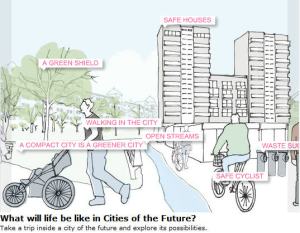 Cities of the Future are densely built. This means we can walk and cycle instead of using cars, reducing pollution. Fewer cars and roads make more room for bike paths and parks. This makes our cities prettier and makes us healthier. The parks will also help absorb the increasing rainfall expected in the future. Cities of the Future is a collaborative project between the Norwegian Government and the 13 largest cities in the country to reduce greenhouse gas emissions and make our cities better places to live.
Cities of the Future are densely built. This means we can walk and cycle instead of using cars, reducing pollution. Fewer cars and roads make more room for bike paths and parks. This makes our cities prettier and makes us healthier. The parks will also help absorb the increasing rainfall expected in the future. Cities of the Future is a collaborative project between the Norwegian Government and the 13 largest cities in the country to reduce greenhouse gas emissions and make our cities better places to live. --> Read on:
--> Read on:
Tuesday, December 4, 2012
The crux of the problem with transportation is that . . .
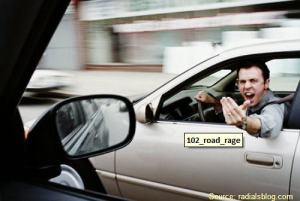
The crux of the problem with transportation is that . . . everyone wants the same thing at the same time, feels entitled to it and doesn’t want to pay more, or differently. And that's not all . .
Oops! What is happening to the American Dream? Are cars on the way out?
The concept of 'Peak Car' responds to the fact that developed countries around the world are seeing car traffic level off rather than increase in line with forecasts 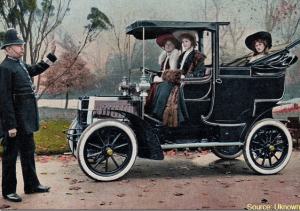 like this, and that in dense urban areas traffic levels are declining. And the inaccuracy (of traditional forecasting methods) has always been one way – massively overestimating the amount of driving people will do. A major report today from the UK shows some of the factors behind patterns of car use, and how policies can change future trends.
like this, and that in dense urban areas traffic levels are declining. And the inaccuracy (of traditional forecasting methods) has always been one way – massively overestimating the amount of driving people will do. A major report today from the UK shows some of the factors behind patterns of car use, and how policies can change future trends.
Sunday, December 2, 2012
Consultancy and Advisory Services: 2013
 One way of looking at World Streets and its partners, multiple networks, continuing research and professional activity in our chosen field is to see it as the tip of a very large "iceberg" of experience and competence which can be put to work on your projects and programs. By making use of and supporting our consultancy and advisory services, you are also helping us to fund and carry on with the journal. Here are some of the ways in which this competence can be put to work in collaboration with others.
One way of looking at World Streets and its partners, multiple networks, continuing research and professional activity in our chosen field is to see it as the tip of a very large "iceberg" of experience and competence which can be put to work on your projects and programs. By making use of and supporting our consultancy and advisory services, you are also helping us to fund and carry on with the journal. Here are some of the ways in which this competence can be put to work in collaboration with others.
Friday, November 30, 2012
Support World Streets (And why)
We have no money gentlemen, so we shall have to think.
– Ernest Rutherford, on taking over Cavendish Laboratory in 1919
World Streets is an independent public interest publication which, as a matter of  policy, we make freely available to all who are looking to understand, support, and contribute to the sustainability agenda anywhere in the world. We firmly believe that there should be no barriers, and especially not commercial ones, to the free circulation of news, tools, counsel and peer exchanges when it comes to the important issues of sustainable development and social justice. To ensure our full independence we do not accept advertising. We depend on the support of our readers, concerned public agencies, foundations and actors in the private sector to keep going.
policy, we make freely available to all who are looking to understand, support, and contribute to the sustainability agenda anywhere in the world. We firmly believe that there should be no barriers, and especially not commercial ones, to the free circulation of news, tools, counsel and peer exchanges when it comes to the important issues of sustainable development and social justice. To ensure our full independence we do not accept advertising. We depend on the support of our readers, concerned public agencies, foundations and actors in the private sector to keep going.
Wednesday, November 28, 2012
Is World Streets doing its job? We asked 100 experts for their views - - and 101 responded.
World Streets needs to catch on before my feet get wet. - The Netherlands
 The results are there for all to see and judge. And we now know that we are going to need a literal world wide web of inputs, collaboration and other forms of support if we are to continue this independent international sustainability adventure in the year ahead. Is what we are doing useful and worthy of support? 101 of our readers picked up their pens and responded to our question.
The results are there for all to see and judge. And we now know that we are going to need a literal world wide web of inputs, collaboration and other forms of support if we are to continue this independent international sustainability adventure in the year ahead. Is what we are doing useful and worthy of support? 101 of our readers picked up their pens and responded to our question. --> Read on:
--> Read on:
Support World Streets: Preliminary guidelines for readers
We have no money gentlemen, so we shall have to think.
– Ernest Rutherford, on taking over Cavendish Laboratory in 1919
World Streets is an independent public interest publication which, as a matter of
 policy, we make freely available to all who are looking to understand, support, and contribute to the sustainability agenda anywhere in the world. We firmly believe that there should be no barriers, and especially not commercial ones, to the free circulation of news, tools, counsel and peer exchanges when it comes to the important issues of sustainable development and social justice. To ensure our full independence we do not accept advertising. We depend on the support of our readers, concerned public agencies, foundations and actors in the private sector to keep going.
policy, we make freely available to all who are looking to understand, support, and contribute to the sustainability agenda anywhere in the world. We firmly believe that there should be no barriers, and especially not commercial ones, to the free circulation of news, tools, counsel and peer exchanges when it comes to the important issues of sustainable development and social justice. To ensure our full independence we do not accept advertising. We depend on the support of our readers, concerned public agencies, foundations and actors in the private sector to keep going.--> Read on:
Congestion as policy. (I have seen worse.)
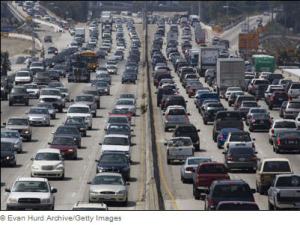 Whether or not congestion is "good" is one thing. But what is for sure is that one way or another congestion is policy, or at the very least a policy option. And in some cases quite possibly a wise one. Now this has been said many times by any people in many places, yet despite its incontrovertible wisdom the message continues to get lost on policy makers. So in cases like this, we have to take a page out of the book of good people who us sell soap and cars, and keep repeating our message. Today, let's hand over the podium to Kent Strumpell from Los Angeles and see what he had to say on our subject in LA Streetsblog back in early 2008. To this reader it has lost none of relevance over almost half a decade. Read on.
Whether or not congestion is "good" is one thing. But what is for sure is that one way or another congestion is policy, or at the very least a policy option. And in some cases quite possibly a wise one. Now this has been said many times by any people in many places, yet despite its incontrovertible wisdom the message continues to get lost on policy makers. So in cases like this, we have to take a page out of the book of good people who us sell soap and cars, and keep repeating our message. Today, let's hand over the podium to Kent Strumpell from Los Angeles and see what he had to say on our subject in LA Streetsblog back in early 2008. To this reader it has lost none of relevance over almost half a decade. Read on.
Tuesday, November 27, 2012
2013 Work Program Highlights
 In the following you will find brief introductions to the selected major policy areas around which we intend to focus and organize our work program over the year ahead. For more you are invited to click the title lines in each case, which will take you directly to the full set of materials and articles thus far developed on that broad topic area under our work program since the first issues of World Streets appeared in the opening days of 2009.
In the following you will find brief introductions to the selected major policy areas around which we intend to focus and organize our work program over the year ahead. For more you are invited to click the title lines in each case, which will take you directly to the full set of materials and articles thus far developed on that broad topic area under our work program since the first issues of World Streets appeared in the opening days of 2009.
Thinking about China: 2013-2015
THINKING ABOUT CHINA: 2013-2015
 The drive to sustainable transport and sustainable cities in China is one of the central focuses of the World Streets 2013-2015 work program just getting underway (it would have to be, wouldn't you say?), as you will see on the small menu item just to your top/left here. Thus far it is organized in two parts:
The drive to sustainable transport and sustainable cities in China is one of the central focuses of the World Streets 2013-2015 work program just getting underway (it would have to be, wouldn't you say?), as you will see on the small menu item just to your top/left here. Thus far it is organized in two parts:- What World Streets has had to offer thus far - Click here
- And from our Facebook page of this title - Click here
- - - >But stay tuned. More to follow here
--> Read on:New Mobility Agenda - Website updating in process
 The New Mobility Agenda at http://newmobility.org has been active since 1988 as a collaborative international network project, and, while evolving steadily in many respects over all these years, has from the beginning stuck to its central focus of sustainable transportation and social justice. And within that carefully defined frame the search for new ideas, examples and approaches for the politics of transport in cities.
The New Mobility Agenda at http://newmobility.org has been active since 1988 as a collaborative international network project, and, while evolving steadily in many respects over all these years, has from the beginning stuck to its central focus of sustainable transportation and social justice. And within that carefully defined frame the search for new ideas, examples and approaches for the politics of transport in cities.
Over the last three years our primary communications medium has shifted from this historic website that has been in constant operation since 1996, to other means of communications and sharing. And as we look ahead to the new year and the challenges it will bring, we are giving thought as to how, if at all, to retrofit and improve the old friend that you see here.
Monday, November 26, 2012
What is the right price for Free Public Transport?
 No Dorothy, it would be nice but there is no such thing as a free lunch. Not even in Kansas. Our cities need money to operate and maintain all the many parts of their hopefully high quality "public transport" systems", but they also need schools, sanitation, health facilities, elderly care, parks and public spaces, security . . . and the long list goes on. Transport, which can finance itself largely if you have the brains to get it right, should not be poaching from these no-less critical basic needs of the community. More, we need our public transport systems (21st century definitions) to be both freely and extensively used (what is sadder than an empty bus!) -- and at the same time build in provisions so that the system is fully equitable as well as efficient.
No Dorothy, it would be nice but there is no such thing as a free lunch. Not even in Kansas. Our cities need money to operate and maintain all the many parts of their hopefully high quality "public transport" systems", but they also need schools, sanitation, health facilities, elderly care, parks and public spaces, security . . . and the long list goes on. Transport, which can finance itself largely if you have the brains to get it right, should not be poaching from these no-less critical basic needs of the community. More, we need our public transport systems (21st century definitions) to be both freely and extensively used (what is sadder than an empty bus!) -- and at the same time build in provisions so that the system is fully equitable as well as efficient.
"I don't believe in charity" - In memory of Roland Dreyfus
Ici chacun sait ce qu'il veut, ce qu'il fait, quand il passe ;
Ami, si tu tombes, un ami sort de l'ombre à ta place. *
Yesterday at the end of a long day I received an email announcing the untimely  and totally unexpected demise of my dear friend and colleague, Rolland Dreyfus, founder and principal inspiration and motor behind the Accès Universel program since its creation in 2006. In case you do not know his work you can follow the program he created with his energy, commitment and vision from its beginning via their website at http://www.accesuniversel.eu (where you will also find the announcement of his death).
and totally unexpected demise of my dear friend and colleague, Rolland Dreyfus, founder and principal inspiration and motor behind the Accès Universel program since its creation in 2006. In case you do not know his work you can follow the program he created with his energy, commitment and vision from its beginning via their website at http://www.accesuniversel.eu (where you will also find the announcement of his death).  What to do? I am not on the board of the association (I am only an advisor) so I am not in a position to get directly involved in the decisions to continue or not either the work of the Association or the website. So rather than sit around moping and feeling absolutely powerless I took the risk of trying something immediately as a modest testimonial to support his work and vision.
What to do? I am not on the board of the association (I am only an advisor) so I am not in a position to get directly involved in the decisions to continue or not either the work of the Association or the website. So rather than sit around moping and feeling absolutely powerless I took the risk of trying something immediately as a modest testimonial to support his work and vision.
Saturday, November 24, 2012
Editor's profile updated

As part of the run-up to preparing the work program for 2013, and securing the financial support needed to continue our operations and meet our ambitious objectives in the year ahead, the original 2009 bio note of the editor has been updated. You can find the latest updated version at http://wp.me/psKUY-2vj. More to follow here on the program and support effort in the coming days.
Friday, November 23, 2012
Learning from Lyon: Free Public Transport that really works
Here is a "free transport project" that is working remarkably well: In the Spring of 2005 the community of Greater Lyon in cooperation with their supplier  JCDecaux launched the world's first mega Public Bike System, Vélo'v. The project put some 3000 bikes into service, available in about 300 stations spread for the most part over the City of Lyon. All this is successful, amply detailed in many places and continues to this day to yield yeoman service for some 60,000 registered users (including the author). To gain access to the system, in addition to one day or one week tickets, the user pays an annual fee of € 25, and when using a bike a caution is debited from the users credit card until it is returned to a parking slot. From a user perspective it is a very successful system and use experience.
JCDecaux launched the world's first mega Public Bike System, Vélo'v. The project put some 3000 bikes into service, available in about 300 stations spread for the most part over the City of Lyon. All this is successful, amply detailed in many places and continues to this day to yield yeoman service for some 60,000 registered users (including the author). To gain access to the system, in addition to one day or one week tickets, the user pays an annual fee of € 25, and when using a bike a caution is debited from the users credit card until it is returned to a parking slot. From a user perspective it is a very successful system and use experience.
* But where is the "free public transport" element?
Thursday, November 22, 2012
Free Public Transport! (But hey, are we talking about the same thing?)
On 22 June 2010 we posted in these pages an invitation to an open thinking exercise welcoming comments and views on the topic of "Free Public Transport".  Two weeks later to get the ball rolling we followed up with a first article setting out some basic principles under the title "Why Free Public Transport is perhaps a bad idea". That posting has been among the more widely read here; as of this morning having been accessed 4,503 times. Beyond that it opened up a small Tsunami of comments, reactions and clarifications, a number of which of high interest and thoughtfulness.
Two weeks later to get the ball rolling we followed up with a first article setting out some basic principles under the title "Why Free Public Transport is perhaps a bad idea". That posting has been among the more widely read here; as of this morning having been accessed 4,503 times. Beyond that it opened up a small Tsunami of comments, reactions and clarifications, a number of which of high interest and thoughtfulness.
But here is the joker: Judging from the responses and conversations that followed it was clear that almost everybody was reading the word "Free" in that phrase as an adjective. But that is not quite what we had in mind. Rather it was part of what we wanted to have views on, but only part of it.

Wednesday, November 21, 2012
Why cycle rickshaws should be driven from the street. (And what it means for mobility, environment, equity and the wellbeing of hundreds of thousands of hard working people and their families)
Let me not poach the information and arguments presented in this fine analysis of the informal transport economy 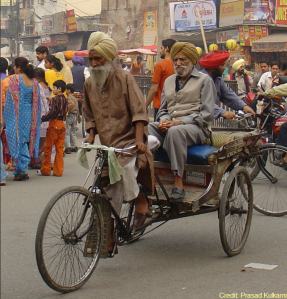 of Ashima Sood's recently published paper in the Economic and Political Weekly (Mumbai), other than to cite her opening summary: "A February 2010 judgment of the Delhi High Court called into question several assumptions underlying policy thinking on the cycle rickshaw sector. Examining these assumptions in the light of new research and advocacy efforts, this article considers the prospect of policy and regulatory reform. With the cycle rickshaw sector as a case study, it argues that the punitive regulatory framework governing the sector embodies the dualist or even parasitic models that inform policy on informal services more broadly. Assessing the larger viability and contribution of informal sector activities requires more attention to local and sector-specific micro-processes."
of Ashima Sood's recently published paper in the Economic and Political Weekly (Mumbai), other than to cite her opening summary: "A February 2010 judgment of the Delhi High Court called into question several assumptions underlying policy thinking on the cycle rickshaw sector. Examining these assumptions in the light of new research and advocacy efforts, this article considers the prospect of policy and regulatory reform. With the cycle rickshaw sector as a case study, it argues that the punitive regulatory framework governing the sector embodies the dualist or even parasitic models that inform policy on informal services more broadly. Assessing the larger viability and contribution of informal sector activities requires more attention to local and sector-specific micro-processes."
